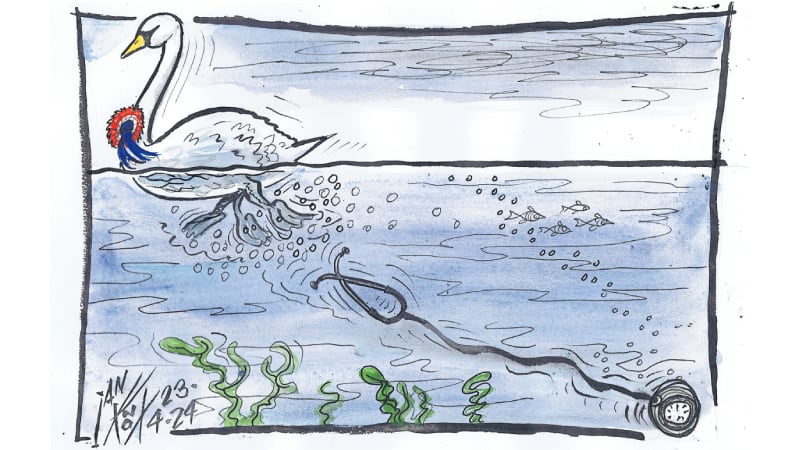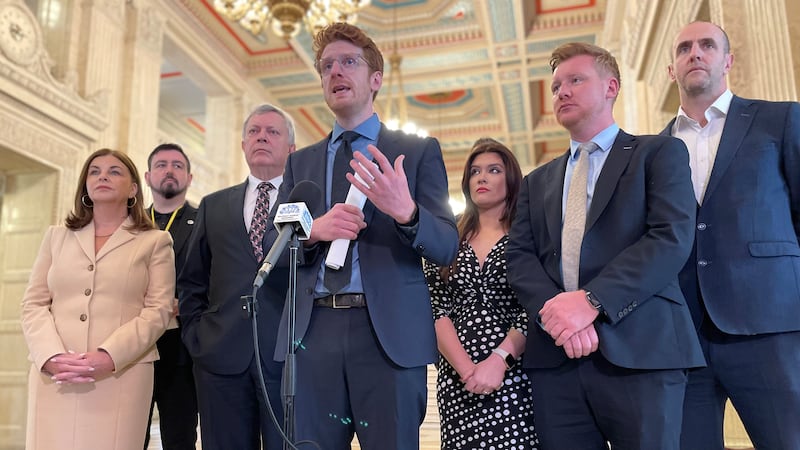A striking theme of Alex Kane’s articles is his increasing pessimism about the future of Northern Ireland. This analysis is grounded in a sense that the strength of the DUP and Sinn Féin reflects a starkly polarised society. You can see why he reaches that conclusion, but in many respects people here are less polarised than before, but politics has not changed to reflect this.
Perhaps we’re simply looking at things the wrong way. Rather than talking about two blocs of voters, unionism and nationalism, that are dominated by the DUP and SInn Féin, with a couple of small parties representing the rest, we should think about the three groups as comprising DUP, Sinn Féin and ‘others’.
In 2017, 803,000 people voted in the assembly election and almost 354,000 (44 per cent) did not vote for the two largest parties. 450,000 didn’t vote at all, many of them making that decision because they were disgusted by the current political set-up. That’s a total of around 800,000 voters who could demand a coalition government that would make this place a success.
There will be different views on the constitutional question among the voters and parties outside the DUP and Sinn Féin. Hopefully, though, they would agree with the principle that the only legitimate way of promoting their preference in the short to medium term is to make Northern Ireland work as well as possible.
An agreement on this concept might show that those who are prepared to work together do actually have the strength in numbers in the event of another assembly election and that the current deadlock can be broken. Outside the political bubble there are constant examples of constructive leadership, right across Northern Ireland, where relationships are built and the damage of the past is repaired.
There is even an argument that Northern Ireland could have a first minister and two deputies, to allow for one for the ‘others’ if they attain a certain threshold of seats. All three groups would have an entitlement to be in the executive, but if one group walked away the other two could govern, with checks and balances to prevent any abuse of power.
It’s all very well being fatalistic, but recent events across the world show that politics can change very quickly and become unrecognisable. The ‘other’ parties could surely agree some basic common policies to help the economy, the health service and to boost integrated education and housing. They could propose a relaxation of the petition of concern, to address social issues that are currently being used as an excuse to avoid responsibility.
When one reflects on the examples on this Island of how to do relationships more constructively then we need look no further than the Irish rugby and hockey teams, the work of the IFA and the Northern Ireland Football fans and the ability of our young sports people to represent the different strands of identity that shape who we as a people actually are. We should challenge our politicians: ‘Why can you not practice your politics in a similar way?’
Alternatively, we can submit to the current climate of pessimism and a future that is dark and divided with a politics that polarises the people with all its consequences. That would indeed be foolish.
TREVOR RINGLAND
Holywood, Co Down
Farmers are custodians of environment and deserve our support
My belief in the ability of nature to regenerate itself was restored, at least temporarily, recently when I saw many red squirrels and Irish hares co-existing in the same fields in Donegal alongside other treasures of nature, now sadly in decline in most parts of Ireland.
This unique experience, at least for me, was witnessed at Dunmore Gardens near Carrigans and is, on discovery, the culmination of years of hard work at this amazing place of peace, serenity and nature at its best. What could be more breath-taking than to see red squirrels hanging from the branches of trees by their tails as they ‘steal’ nuts from feeders, put there to support the many birds that add to the splendour of this old manor house.
Environment schemes promoted and funded by the Department of Agriculture, Environment and Rural Development (DAERA) must, and hopefully do, support the fairytale dreams that have become a reality at Dunmore Gardens.
This surely is the contrast to intensive farming promoting massive increases in ammonia and other by-products of factory farming which creates so many challenges for those protecting our environment.
Unfortunately, in the absence of an assembly there is little opportunity to assess the magnitude of the ammonia problem as many more intensive farm projects receive planning approval with no regard to how the waste is disposed of without adding to the over-intensification of ammonia and other nutrients in our soil.
This is an issue which will create havoc for the health of future generations and it is the responsibility of this generation to ensure that we do not leave a legacy of contamination which not only affects health but the future of our Irish hare, our red squirrels and God knows how many other species of wild life that are currently at risk.
Our farmers are the custodians of our environment and they deserve our support and that of DAERA but when farming becomes factory farming owned and controlled by big business then there is every reason to be concerned and from that point of view hopefully Dunmore Gardens is not the last of the summer wine but the beginning of a new experience and a new respect for nature and everything it offers.
JOHN DALLAT
SDLP Environment Spokesperson
MBC could heal bitter Brexit divide
Many Brexiteers would probably not accept a two-option ‘remain v May’s eventual deal’ ballot. ‘Second Brexit vote could lead to civil disobedience, says Labour MP’ (August 21) and a ‘WTO v May’s eventual deal’ question would be equally unfair for the ‘remainers’.
There are at least three options ‘on the table’.
So any ‘meaningful vote’ in parliament and/or in any second referendum should be multi-optional. Such a ballot could be counted as in a plurality vote (which is like a British first-past-the-post election); a two-round system (à la French elections); an alternative vote (which the Australians use and in its PR form so do the Irish); or a preferential points system – the Modified Borda Count (MBC) – (and the BC is part of the Slovenian electoral system).
The first three are all divisive and often inaccurate – furthermore, they are win-or-lose. An MBC, however, is win-win. At best, it identifies the option which is everyone’s highest average preference, and an average, of course, involves every voter, not just a majority of them. So an MBC could help, not only to identify that option which is the most popular but also, in doing so, to heal what is now the bitter Brexit divide.
PETER EMERSON
Director, the de Borda Institute, Belfast BT15
Political blindness
Like many others I believe it’s an absolute disgrace and an insult to workers and community volunteers that MLAs and some MPs are getting paid for pretending to work.
A Dublin taxi driver recently said to me: ‘Sorry to tell you that sheep up there in the Wicklow hills have more political brains than many voters in NI.” He then added: ‘We wouldn’t consider unity until NI can support itself financially and trouble makers have disappeared.” Having worked and lived in the Republic for 30 years I wasn’t surprised at his comments. During those years I never had to use a word of Irish learned at school and the only time NI was mentioned was after horrific acts of inhumanity. Deletion of fake red lines is long overdue and a focus has to be on solutions to numerous problems associated with community relations, healthcare, education, employment, infrastructure etc.
Sadly we have another elephant in the room ie Brexit – given a yes by those who hadn’t a clue about its consequences.
Obvivously political blindness is not confined to Northern Ireland.
J ROONEY
Enniskillen, Co Fermanagh







